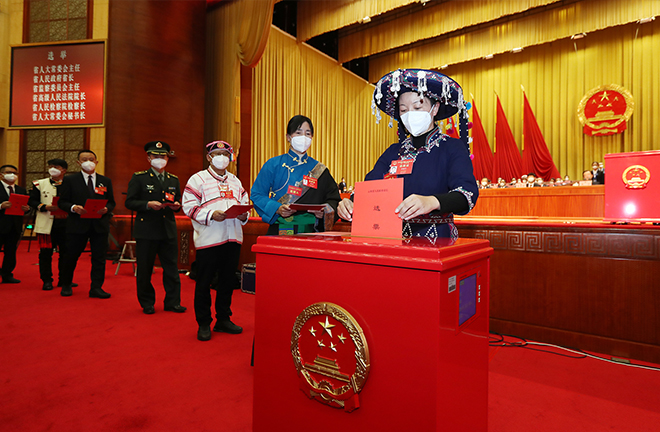‘Two Sessions’ exemplifies whole-process people’s democracy

Representatives of ethnic groups vote at the closing meeting of the first session of the 14th Yunnan People’s Congress on Jan. 15. Photo: CFP
Chinese President Xi Jinping urged efforts to actively develop whole-process people’s democracy while addressing the closing meeting of the first session of the 14th National People’s Congress (NPC) on March 13.
During the “Two Sessions,” the annual meetings of the NPC and the Chinese People’s Political Consultative Conference (CPPCC), NPC deputies and members of the CPPCC National Committee ranged from leading officials at all levels to ordinary workers and farmers, from teachers in rural primary and secondary schools to academicians and professors in higher education institutions and scientific research institutions, and from managers of high-tech industries to inheritors of intangible cultural heritage. They upheld the value orientation of putting the people first, closely followed each agenda, and performed their duties, engaging in discussions concerning national policies and principles.
Bamo Qubumo, a deputy from the delegation of Yunnan Province, and a research fellow from the Institute of Ethnic Literature at the Chinese Academy of Social Sciences, was elected as a member of the Standing Committee of the 14th NPC and a member of the NPC’s Ethnic Affairs Committee.
She mentioned specific suggestions put forward during the deliberation of the Yunnan delegation, for example, building a strong ecological security barrier in southwestern China, building a national crop breeding base, ensuring the high-quality and balanced development of compulsory education in areas with large ethnic minority populations, advancing the construction of demonstration areas for ethnic unity and progress, and innovating and developing new energy industries. These concrete suggestions embody China’s push to promote the Chinese concept, practice, and input of actively developing whole-process people’s democracy through the Two Sessions.
The Legislation Law is the basic law that regulates the national legislative system and lawmaking activities, and maintains the unity of the socialist rule of law. Since the most recent amendments in 2015, the Legislation Law saw amendments again this year. An important part of this year’s amendments is to implement the major concepts and practical requirements of whole-process people’s democracy, and actively respond to the new needs and expectations of the people.
During the first session of the 14th NPC, 271 motions were raised by delegations or jointly proposed by more than 30 deputies, including 268 motions related to legislation. Among these motions, Bamo Qubumo was most concerned with those focusing on pursuing green development and promoting harmony between humanity and nature, as well as enhancing cultural confidence and turning China into a country with a strong socialist culture.
She paid particular attention to the making of the national parks draft law, the draft law on conserving the ecosystem of the Qinghai-Tibet Plateau, the draft law on the promotion of cultural industries, and the draft law on promoting nationwide reading, as well as amendments to the Environmental Protection Law, the Land Administration Law, the Law on Cultural Relics Protection, and the Intangible Cultural Heritage Law.
“The motions on the legislation and amendments in these key areas are problem-oriented and reflect the aspirations of the people, which will help make laws in a well-conceived and democratic way and in accordance with the law, ensure legislative work is more systematic, holistic, coordinated, and responsive, and speed up work on developing the system of socialist rule of law with Chinese characteristics,” said Bamo Qubumo.
Whole-process people’s democracy is the defining feature of socialist democracy; it is democracy in its broadest, most genuine, and most effective form. All power of the state in China belongs to the people. The people have the right to equal participation in state and social affairs.
Hong Xianghua, a professor at the Party School of the Central Committee of CPC (National Academy of Governance), said that over the past 70-odd years since the PRC’s founding, the Party has led the people to create the miracles of rapid economic development and long-term social stability, exactly because their interest appeals have been satisfied and their human rights protected, so that they are willing to participate in nation-building.
Edited by CHEN MIRONG

 PRINT
PRINT CLOSE
CLOSE